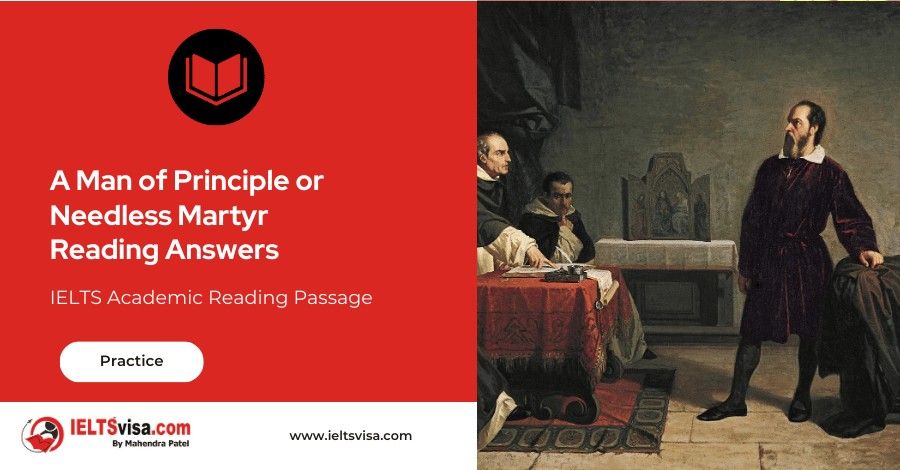A Man of Principle or Needless Martyr Reading Answers
IELTS Academic Reading Passage
Sir Thomas More was the most brilliant Englishman of his age in an age, the early Renaissance, which is thought to be particularly brilliant. He scaled the heights in law, in philosophy and literature, and attained high political rank as Chancellor. But the most challenging thing about this man is nothing that he achieved in life but the nature of his death. The facts are well known. He was executed by King Henry VIII in 1534 for refusing to accept Henry as head of the church in England. What is unclear is why he chose to refuse, and to die in this way.
Clouding the issue are the political and religious arguments which were at the root of his refusal and his death. It will be remembered that King Henry VIII was, for most of his life, an ardent Catholic who was awarded the title of Defender of the Faith for his resistance to the Protestant reformation. But his desperation for a male heir led Henry to divorce his first wife, Catherine of Aragon, in favor of the younger Ann Boleyn who offered the promise of a son. High politics among the crowned heads of Europe meant that this could only be achieved by a break with Rome and the acceptance of Protestantism in England. In a time when religion was taken very seriously by whole populations there was bound to be resistance.
Traditional Catholic writers, such as Friar Anthony Foley, have cast “More as a martyr who stood up for the cause of Catholicism and perished for the true religion. “More was a beacon of light in those dark times,” says Friar Foley, “whose actions have shown the path of righteousness for true believers even down to the present day.” This interpretation was convenient for the Catholic church, then as now, and resulted in More being made a saint. It ignores, however, the fact that More took every step to stop his ideas being made a political issue. Whatever reason he had it was not support of the Catholic church. It also does not explain why More chose to take a stand, and effectively commit suicide, on this issue. Even under the teachings of the Catholic church he could have sworn the necessary oath to Henry because he was under duress. The church in his day did not expect or require him to refuse. More’s personal beliefs were his own but refusal to take the oath is what condemned him.
A more recent biography, by Paul Hardy, views More as a medieval man and not the renaissance man he is often seen as. As such, Hardy argues, he would have been deeply conservative. The changes which Henry was embracing, with the acceptance of Protestantism, would have been highly offensive. “As a lawyer and Chancellor, More had spent his life defending the status quo and now, at the stroke of a pen, it was turned round,” he writes. This rather ignores the deliberate modernity which imbued every other aspect of More’s life from legal reform to the rewriting of school textbooks.
Other writers, such as the psychotherapist Bill Blake, see More’s demise as an example of depressive illness. Melancholy was widely known at the time but not seen as an illness. It is not implausible that under the strain of work and the profile of his position as Chancellor, he succumbed to depression and, desperate and indecisive, let death sweep over him. But contemporary reports are at odds with this. He made every effort to comfort and cheer up his own relatives and never appeared lost or undecided.
Since More himself left no explanation we will probably never really know what his motivation was. However, Hardy’s observations are very true in some respects in that More lived in a very different world and one that is hard for us to understand. Life could be very cheap 500 years ago especially if one held high political office or intellectual views at odds with the establishment. There is no better way of appreciating this than to consider the fate of the poets in the Oxford Book of Sixteenth Century Verse. Two thirds of these poets died violent deaths, almost all at the hands of an executioner. With the possibility of death ever present it seems to have been regarded then with something less than the dread it evokes today. Perhaps this is what happened with More. After a lifetime of good fortune, considerable luxury and achievement, the wheel of fortune had turned, and he accepted his fate with good grace in the hope of an even better life in the hereafter.
Questions 27-34
Classify the following statement as referring to Writers
A. Foley
B. Hardy
C. Blake
D. The writer of the article
E. Contemporary writers
Example: More took a religious stand against Protestantism.
Answer A
Write the appropriate letters in boxes 27 – 34 on your answer sheet. You may use any answer more than once
27. More was suffering from depression when he died.
28. More was a traditionalist in his views.
29. More could have taken the oath and remained a Catholic.
30. More had a positive attitude to life and helped others.
31. More was defending the true faith..
32. More resigned himself to the fact that his good luck had changed.
33. More had a lifestyle which is difficult for modern man to comprehend.
34. More showed he was a modern man in his restructuring of the law and education.
Questions 35-40
For questions 35 – 40, choose the best answers. A, B, C or D, according to the information in the text. Write your answers on the answer sheet.
Question 35. Henry VIII executed More because
A Henry VIII wanted a son
B More believed in Protestantism
C More was a Chancellor
D More refused to take an oath
36. More’s death is a mystery because
A he chose to be executed
B he left no written explanation
C the facts of his death are not known
D it is bound up in religious controversy
37. Which of the following was More NOT expert in?
A literature
B religion
C philosophy
D law
38. The writer disbelieves traditional views of More’s death because
A More committed suicide
B More didn’t follow Catholic teaching in refusing the oath
C theories of depression are more persuasive
D little is really understood of the time More lived in
39. According to the writer, the life of an intellectual 500 years ago could be dangerous
A because the standard of living was cheap
B because they held high political office
C if they held dissident views
D if they suffered from depression
40. Henry VIII broke from Rome because
A he believed Protestantism was the true faith
B Rome refused him a divorce
C he wanted to ensure the succession
D he wanted to marry Ann Boleyn

Solution For: A Man of Principle or Needless Martyr
Reading Answers
| 27. C | 34. D |
| 28. B | 35. D |
| 29. D | 36. B |
| 30. E | 37. B |
| 31. A | 38. B |
| 32. D | 39. C |
| 33. D | 40. C |
Review and Practice
- Regularly practice with IELTS reading samples and time yourself to get used to the pressure of the exam.
- Review your mistakes to understand where you went wrong and how to avoid similar errors in the future.
Our Books
Master IELTS Speaking Part 1
IELTS Writing Task 1 Book
IELTS Writing Task 2 Book
A Man of Principle or Needless Martyr Reading Answers Explanation
Comin Soon
Practice IELTS Other Modules
IELTS Listening
The IELTS Listening test assesses how well you can understand spoken English in various contexts. It lasts about 30 minutes and is divided into four sections with a total of 40 questions. The listening tasks become increasingly difficult as the test progresses.
IELTS Academic Reading
The IELTS Academic Reading section assesses your ability to understand and interpret a variety of texts in academic settings. It is designed to evaluate a range of reading skills, including skimming for gist, reading for main ideas, reading for detail, understanding inferences, and recognizing a writer's opinions and arguments.
IELTS Speaking
The IELTS Speaking test assesses your ability to communicate in English on everyday topics. It lasts 11-14 minutes and consists of three parts: introduction, cue card, and a discussion based on the cue card topic.
IELTS General Reading
IELTS General Reading tests your ability to understand and interpret various types of texts. Here are some key areas and types of content you can expect to encounter in the reading section, along with tips for effective preparation.
IELTS Academic Writing Task 1
In IELTS Academic Writing Task 1, you are presented with a visual representation of information, such as graphs, charts, tables, or diagrams, and you are required to summarize, compare, or explain the data in your own words.
IELTS General Writing Task 1
In IELTS General Writing Task 1, you are required to write a letter based on a given situation. The letter can be formal, semi-formal, or informal, depending on the prompt. Here’s a breakdown of the key components to include in your letter
IELTS Academic Writing Task 2
In IELTS Academic Writing Task 2, you are required to write an essay in response to a question or topic. Here’s a guide to help you understand the essential elements of this task
IELTS Exam Tips
To succeed in the IELTS exam, practice regularly, familiarize yourself with the test format, improve your vocabulary, develop time management skills, and take mock tests to build confidence.
Grammer for IELTS
Grammar is the foundation of effective communication in English. Understanding tense usage, subject-verb agreement, and sentence structure enhances clarity and coherence in writing and speaking.
Vocabulary for IELTS
Vocabulary plays a crucial role in the IELTS (International English Language Testing System) exam, especially in the Speaking and Writing sections. Here’s an overview of why vocabulary is important and how it impacts your performance
RECENT IELTS SAMPLES QUESTIONS AND ANSWERS
Walking with dinosaurs
Peter L. Falkingham and his colleagues at Manchester University are developing techniques that...
Money as the Unit of Amount Reading Answers
The most difficult aspect of money to understand is its function as a unit of account. In...
WEATHERING IN THE DESERT
In the deserts, as elsewhere, rocks at the earth's surface are changed by weathering, which...
Nature on Display in American Zoos
The first zoo in the United States opened in Philadelphia in 1874, followed by the Cincinnati...
Can We Prevent the Poles From Melting
Such is our dependence on fossil fuels, and such is the volume of carbon dioxide we have...
Air conditioning the earth reading answers
The circulation of air in the atmosphere is activated by convection, the transference of heat...













